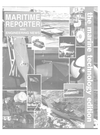
Green GL Passports For Boxship Trio
Marking a departure from the company's highly effective chartering strategy of the past 30 years, three self-owned newbuilds are being phased into Contship Containerlines' core Australasian trades during the 2002 second- half.
The 4,115-teu Contship Aurora class is technically distinguished by its considerable scope for perishable cargo, in that 1,300 plugs have been incorporated for integral type refrigerated containers. The trio ordered from Daewoo Shipbuilding & Marine Engineering is replacing tonnage deployed on Contship's Eagle service between Europe, Australia and New Zealand, operated in partnership with P&O Nedlloyd's eastabout and Mediterranean strings, and will ultimately contribute to a new, weekly eastabout, roundthe- world schedule.
The dimensioning and engineering of the design for up to 1,300 reefer units equates to a potential, temperature-controlled cargo volume of around 2-million cu. ft., one of the biggest concentrations of reefer transport capacity at sea today. Underscoring Contship's long-term commitment to the business, the investment in the Contship Aurora, Contship Australis and Contship Borealis has been shaped not only by considerations of through-life economic performance and asset value, but also with due regard to rising expectations as to environmental protection.
A circumspect approach to the ecological properties of the design is reflected in each ship's construction to the parameters set by Germanischer Lloyd for its new Environmental Passport classification category.
The 'Green Passport' documents the environmental credentials of the ship through a certified compilation of all characteristics relevant to various national and international standards along with the basic requirements laid out in the society's Environmental Service System(GL-ESS) guidelines. The information is put together in such a way as to facilitate use by authorities and agencies for specific purposes such as processing applications for environmentally-governed fee reductions, or running checks on a vessel's environmental status.
There are compelling economic and competitive reasons for shipowners to meet or anticipate the most demanding environmental criteria through voluntary measures, such as the adoption of innovative ecological technologies on board. In addition, more and more shippers and industrial producers have an environmental agenda, which filters down to heightened expectations of environmental performance on the part of the transport service providers.
Against this backcloth, GL has developed its Environmental Service System. While this presently consists of the Environmental Passport, the intention is to extend the concept by introducing an Environmental Passport Information System(GL-EPIS).
Other stories from September 2002 issue
Content
- Recent Wartsila Four-Stroke Engine Developments page: 52D
- CMR: Monitoring is Control page: 52G
- Caterpillar Offers New C12 Engine page: 52H
- GAO Affirms DD(X) Contract to Gold Team page: 8
- Northrop (arumman Unloads Hair-built 1 roiect America ohip to JNLL page: 10
- Oil Recovery Project Makes Progress page: 11
- Crowley Christens Tug Response page: 14
- NASSCO and TOTE Christen Midnight Sun page: 15
- " T a x i ! ? " page: 16
- Kvaerner Masa-Yards Delivers Carnival Legend page: 17
- Crewing and Maritime Security page: 18
- President Cuts USCG Funding page: 21
- Bollinger Builds Next Generation Liftboat page: 21
- Three Hulls = One Ship page: 22
- What Hull Shape Is Best? page: 27
- Advances in CAD and CAM System Integration page: 30
- Precision Ship-Handling Writ Large page: 34
- NautiCast Offers AIS Solution page: 38
- Modern Maid-of-All Work page: 40
- Green GL Passports For Boxship Trio page: 40
- A German Ferry for All Harbors page: 43
- Optimal Electric Ship Propulsion Solution page: 50
- New Technology Has Promising Maritime Applications page: 52
- Stern Tube Lubricant Absorbs Costs page: 58
- The New Hunter/Gatherers page: 60
- Interactive Format for Repair and Conversion's Main Event page: 64
- New England's Fall Foliage Is Setting For SNAME 2002 page: 66
- Fleet Privatizations Expected Soon For Lithuanian Companies page: 67
- Halter is Back page: 68
- Halter Moss Point: This Way is Up page: 71
- Stealthy ROV Keeps Divers Out of Danger page: 73
- New Center for Fire and Evacuation Safety page: 75
- U.S. Market: Foundation for the Future page: 78
- Port Authority Receives Approval page: 87

